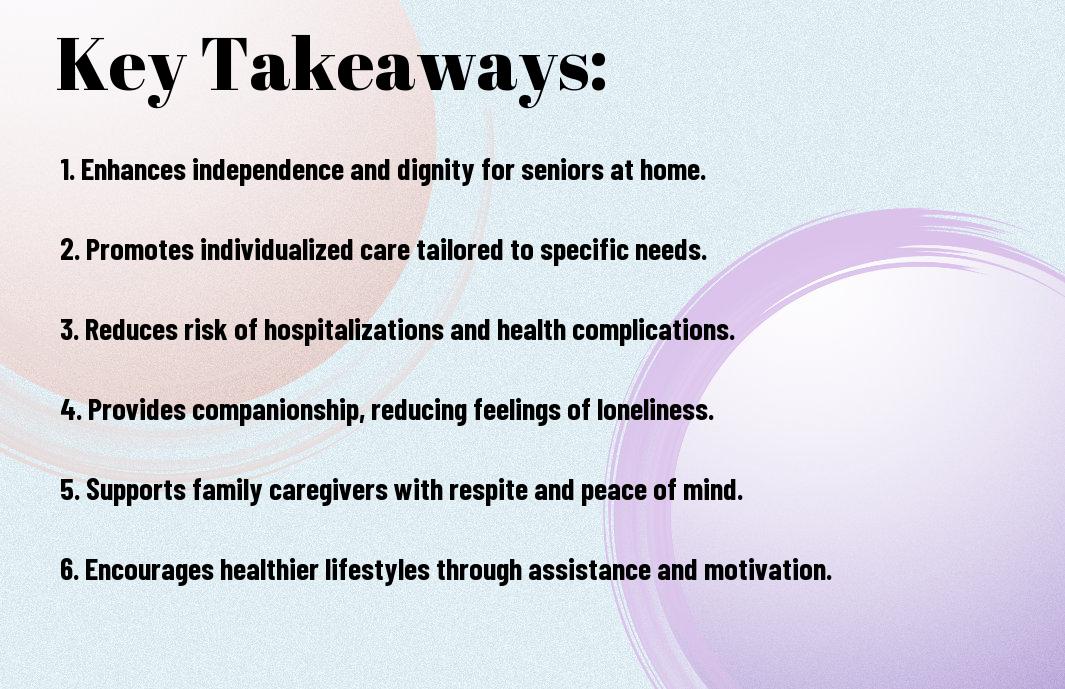Seniors often face various challenges as they age, making home care an increasingly important consideration for their well-being. This comprehensive guide explores the top benefits of home care, emphasizing how it promotes independence and enhances quality of life. By receiving personalized support in a familiar environment, they can enjoy greater comfort and security. Additionally, home care services can provide companionship, alleviating feelings of isolation and ensuring that they remain connected to loved ones. Understanding these advantages can empower families to make informed decisions about the best care options for their elderly relatives.
Key Takeaways:
- Personalized Care: Home care services offer tailored support that meets individual needs, ensuring seniors receive the specific assistance they require.
- Enhanced Independence: These services promote autonomy for seniors, allowing them to live in their own homes while receiving necessary help with daily activities.
- Companionship and Emotional Support: Home care provides meaningful interaction, helping to combat loneliness and promote mental well-being among elderly individuals.

Understanding Home Care
To appreciate the concept of home care, one must recognize it as a comprehensive approach that delivers personalized support to seniors within the comfort of their own homes. This care can range from basic assistance with daily activities to more specialized health care services, allowing elderly individuals to maintain their independence while receiving the necessary help.
Definition of Home Care
Any form of assistance provided to seniors in their residences is recognized as home care. It encompasses a variety of services tailored to meet the unique needs of each individual, enabling them to live as comfortably and independently as possible. Home care can involve personal care, medication management, and companionship.
Types of Home Care Services
Types of home care services can vary widely, ensuring that seniors receive the support they need. Here are several common types:
- Personal Care
- Companionship Services
- Specialized Medical Care
- Respite Care
- Homemaker Services
Perceiving the variety of options allows families to choose appropriate services to enhance their loved one’s quality of life.
| Service Type | Description |
| Personal Care | Assistance with bathing, dressing, and hygiene. |
| Companionship Services | Providing social interactions and emotional support. |
| Specialized Medical Care | Nursing services for chronic conditions or post-operative care. |
| Respite Care | Temporary relief for primary caregivers. |
| Homemaker Services | Help with household tasks such as cleaning and meal preparation. |
Types of home care services listed above focus on catering to various needs of seniors, providing them with the necessary support tailored to their individual circumstances. Each service plays a pivotal role in ensuring their safety, health, and overall well-being.
- Personal Care
- Companionship Services
- Specialized Medical Care
- Respite Care
- Homemaker Services
Perceiving the significance of each type of service can help families make informed decisions about the best care options for their loved ones.
| Service Type | Description |
| Personal Care | Support with daily activities like grooming. |
| Companionship | Engagement in social activities to ward off loneliness. |
| Medical Care | In-home healthcare by qualified professionals. |
| Respite | Temporary care to give primary caregivers a break. |
| Homemaking | Support with chores to maintain a clean living space. |
Benefits of Home Care
It provides a multitude of advantages for seniors, ensuring they receive necessary support in the comfort of their own homes. Home care enables personalized assistance tailored to individual needs, fostering independence while ensuring safety and security. Additionally, it offers both medical and non-medical services that can significantly enhance health outcomes and overall well-being. This holistic approach is designed to improve quality of life while reducing the need for more intensive care options.
Personalized Care Solutions
Home care solutions are customized to meet the unique needs of each individual, taking into account their medical history, personal preferences, and daily routines. By creating a tailored care plan, caregivers can focus on specific challenges, ensuring seniors receive the support they truly need, whether it is help with daily activities, medication management, or companionship. This personalized approach empowers seniors to maintain their dignity and fosters a sense of autonomy.
Enhancing Quality of Life
For seniors, home care plays a crucial role in enhancing their overall quality of life. By ensuring they receive the right level of assistance, it significantly reduces feelings of isolation and loneliness, promoting mental well-being. Caregivers not only assist with physical tasks but also provide social interaction and emotional support, which are vital for a happier, healthier lifestyle. Home care services encourage engagement in meaningful activities, fostering independence and a sense of purpose.
Life for seniors receiving home care can see remarkable improvements as they benefit from increased independence and connection to their community. With caregivers available to support daily routines and personal interests, they can engage in stimulating activities that enhance mental sharpness and emotional well-being. The ability to remain in familiar surroundings reduces stress and anxiety associated with moving to a care facility, allowing them to flourish in a more supportive and nurturing environment. Ultimately, this holistic approach to care not only addresses physical needs but also promotes an overall sense of well-being and fulfillment.
Comparing Home Care to Other Options
Keep in mind that choosing the right care option is crucial for seniors and their families. While each option has its own advantages and drawbacks, home care often stands out for its personalized approach. For a deeper exploration of the various care alternatives available, refer to The Comprehensive Guide to Understanding Home Care Benefits. The comparison can be summarized as follows:
| Home Care | Nursing Homes |
| Personalized care in a familiar environment | 24/7 medical supervision and assistance |
| Flexible scheduling | Structured routine |
| Potentially lower costs | Higher overall expenses |
Home Care vs. Nursing Homes
Home care allows seniors to receive personalized support in the comfort of their own homes, promoting independence and familiar surroundings. In contrast, nursing homes provide continuous medical supervision which is imperative for individuals with severe health conditions. Ultimately, the choice between these two options depends on the level of care required and the senior’s desire to remain in their own space.
Home Care vs. Assisted Living Facilities
Options like assisted living facilities may offer some companionship and community resources, but they often lack the level of personalized attention found in home care. In assisted living, seniors share space with others and may have limited privacy, which can be a drawback for those who value their independence.
To understand the implications of these choices, it’s important to consider the personal needs of the senior. Home care often allows for a tailored care plan that fits the individual’s lifestyle and preferences. Conversely, assisted living facilities may impose a rigid schedule and can lead to feelings of isolation for some. The continued independence provided by home care can significantly enhance their quality of life. Thus, a thorough evaluation of both options is imperative to ensure the senior receives the care that suits them best.

Financial Considerations
Once again, when evaluating options for senior care, financial considerations play a crucial role. Families often seek the most effective solutions that fit their budget while ensuring the well-being of their elderly loved ones. Understanding the costs associated with home care compared to other alternatives can foster informed decisions that contribute to overall peace of mind.
Cost-Effectiveness of Home Care
Cost-effectiveness is a notable advantage of home care services for seniors. Not only are they generally more affordable than nursing homes or assisted living facilities, but they also provide personalized care in a familiar environment. This setting can lead to improved emotional well-being and overall health, potentially reducing hospital visits and associated costs, making home care a financially savvy choice.
Insurance and Payment Options
Cost-effectiveness extends to insurance and payment options available for home care services. Many families explore various financial avenues to support their loved ones, including private pay, long-term care insurance, and Medicaid. Each option has its nuances, and it is crucial for families to understand eligibility criteria and coverage limits to maximize the benefits of the resources available to them.
To effectively navigate the landscape of insurance and payment options for home care, families should carefully consider both public and private funding sources. They may find that Medicaid can cover certain home health care services for those with limited income and assets, while long-term care insurance policies often help offset costs for a broader range of services. It is imperative for clients to verify coverage details with their insurance providers to avoid unexpected out-of-pocket expenses. Being aware of the benefits, exclusions, and requirements of various options can empower families to make informed, financially responsible decisions regarding their loved one’s care.
Finding the Right Home Care Provider
Many families understand that selecting the right home care provider is a critical decision that can significantly impact a senior’s quality of life. She needs to find a provider that aligns with her specific care requirements, values, and comfort level. Researching various options, checking credentials, and reading reviews can help in making an informed choice.
What to Look For
Home care seekers should prioritize several key factors when evaluating providers. These include licensing and accreditation, the experience of caregivers, and the range of services offered. Additionally, compatibility with the senior’s lifestyle and strong communication skills from the caregivers are vital for ensuring a positive caregiving relationship.
Questions to Ask Potential Providers
On the journey to discovering the best home care provider, she should ask detailed questions to gauge their expertise and suitability. This ensures that they can address her specific needs effectively and that she feels comfortable entrusting them with her loved one’s care.
Look for responses that highlight the provider’s level of experience, as well as whether they can offer tailored care plans. Key questions might include how long they’ve been in business, what kind of training the caregivers receive, and how they handle emergency situations. It’s also important to inquire about client satisfaction rates and to request references. Transparency regarding fees and services is important, as is confirming that the provider can promptly accommodate changes in care needs. By diligently asking these questions, he or she can feel assured that they are making an informed choice for reliable home care.
Tips for a Smooth Transition to Home Care
After deciding on home care for seniors, families can help ensure a smooth transition by following these tips:
- Communicate openly with the senior about their needs
- Choose the right caregiver based on compatibility
- Outline a schedule that suits the senior’s routine
- Involve family members in care discussions
- Monitor the care experience regularly
Knowing that every transition may have its challenges, families can also explore the Top 3 Benefits of Home Care for Seniors to reinforce their decision.
Involving Family in the Process
For a successful transition to home care for seniors, involving family members is crucial. Family can provide valuable insights into the senior’s preferences and needs, making the transition feel more supportive and less overwhelming. They can also assist in making decisions about the type of care required, ensuring everyone is on the same page.
Setting Up a Care Plan
On initiating home care, it is vital to create a comprehensive care plan. This involves evaluating the senior’s specific needs, daily routines, and preferences to tailor the support accordingly.
Care plans should include detailed information on the senior’s health condition, medication schedules, and routines to ensure they are adequately met. Additionally, it is vital to outline specific goals for care, such as improving mobility or social interaction. Neglecting to establish a clear plan may lead to unmet needs, while a well-defined care plan fosters a sense of security and comfort, ensuring the highest quality of life. Regular reviews of the care plan are vital for adapting to any changes in the senior’s condition or preferences.
Final Words
Hence, the top benefits of home care for seniors provide a multitude of advantages that enhance their quality of life. This comprehensive guide underscores how personalized care, companionship, and support with daily activities enable seniors to maintain their independence and dignity. By choosing home care services, they ensure safety in familiar surroundings while receiving tailored assistance that addresses their unique needs. Ultimately, both seniors and their families can experience peace of mind, knowing that they are prioritizing health and well-being through professional, compassionate care at home.
FAQ
Q: What are the primary benefits of home care for seniors?
A: Home care offers several key benefits for seniors, including personalized care tailored to individual needs, enhanced comfort and familiarity of being in their own home, and the preservation of independence. Additionally, home care can improve the overall quality of life by providing companionship and reducing feelings of loneliness and isolation. It can also help prevent unnecessary hospitalizations and enable families to maintain a closer relationship with their loved ones during their later years.
Q: How does home care differ from assisted living facilities?
A: Home care primarily focuses on providing support and assistance to seniors in the comfort of their own homes, allowing them to maintain their independence while receiving personalized care. In contrast, assisted living facilities provide a more communal living environment where seniors receive help with daily activities, meals, and medical care on-site. Home care can be more flexible and adaptable to the individual needs of seniors, while assisted living facilities may offer a more structured environment.
Q: What types of services are typically included in home care for seniors?
A: Home care services for seniors can vary widely depending on individual needs, but they generally include assistance with daily living activities such as bathing, dressing, grooming, meal preparation, and medication management. Many home care providers also offer companionship services, light housekeeping, transportation to appointments, and specialized care for chronic illnesses or rehabilitation after surgery. These services can be customized to meet the specific requirements and preferences of each senior client.

